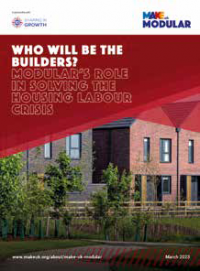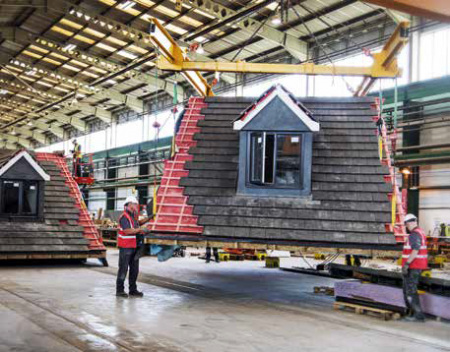As Make UK Modular releases its year one impact report, Director Steve Cole outlines the huge progress made so far and what lies ahead for the modular housing sector.
To say that politics has been volatile since Make UK Modular launched in December 2021 is an understatement. But, as politicians begin to turn their thoughts towards a general election, one thing is clear – housing has slowly, inexorably, and perhaps inevitably returned to frontline politics.
For the team at Make UK Modular this means redoubling our efforts. In our year one impact report 'Insight, Impact & Influence 2022' we made strong initial progress in a number of areas. Our priority for year one was to establish ourselves as the voice of the modular housing sector by:
- Establishing a strong working relationship with Government, the opposition, MPs, and the Civil Service
- Building a robust and credible evidence base about the benefits and potential of modular housing
- Establishing and delivering against policy priorities
- Delivering a consistent, positive media and public affairs presence
- Growing our membership
I'm proud that we made significant progress on all of these areas so quickly. It's a testimony to the can-do attitude of our members and their desire to really make an impact on the housing crisis. Of course, we can't simply rest on our laurels.
With all the understandable noise about the short-term prospects of the housing market it's easy to lose sight of the medium and long-term. Of course, this is a true in Government as it is in business. Over the next 12 months we're likely to see political parties commit to new (most likely vague) targets around the total number of homes built, increasing home ownership, increasing affordable housing, and greening our old, cold housing stock.
However, as our recent report 'Who will be the builders? Modular's role in solving the housing labour crisis' shows, there is a whopping great elephant in the room. Labour shortages. No Government can come close to its 300,000 new homes a year target by 2025 or even by 2030 without dramatic change in way we build houses the construction workforce is simply too small. Let alone can they deliver the net zero and building safety retrofit our housing stock so badly needs.
Even if all planning rules were abolished and housebuilding had all the cash ministers could throw at it, the sector could still build no more homes as they don't have the specialist workforce to make them. A big part of the solution, is, of course, driving up the number of housebuilding apprentices which delivered only 11,000 completed apprenticeships for the entire construction industry last year.


We also need to look at how we build, and how we bring people from different backgrounds into housebuilding. Modular homes can be a mainstay of this because these factory-made houses target a different pool of workers with the skills to work in precision manufacturing. Only 10% of modular workers are in construction roles. Instead, they are in manufacturing. The skills needed are easy to learn on the job with inhouse training, and efficient assembly line processes mean modular house builders use 50% fewer workers to construct the same number of homes. This builds additionality in supply while also delivering productivity gains of up to 40%.
This isn't about replacing traditional labour or skills or putting people out of work. It's about creating additionality in the market, meaning more homes, more jobs, more taxes paid into the Treasury, and more economic activity and growth. Traditional building can and must keep building, but modular can supplement what it does without cannibalising an already over stretched workforce.
The UK needs to build nearly 92,000 extra houses annually to reach the 300,000 homes target. Hypothetically, modular could deliver this with as few as 46,000 extra workers, of which only 5,000 to 10,000 may need to be in skilled construction trades. In contrast, building these extra homes traditionally would likely require 103,000 additional workers (on top of the 34,000 needed to replace retirees) with a far greater proportion in scarcely available construction trades.

Like any nascent sector, in order to deliver, the sector needs government's backing as it scales up. Of course, we like the whole of the housebuilding sector would also like to see progress on the permacrisis facing planning and we are working closely with other leading trade bodies on this. There are also a number of specific policy levers to grow modular specifically. Therefore, we are calling on Government to:
- Remove the accidental double government levy charge on modular manufacturers by exempting them from the scope of the CITB levy.
- Build supply chain capacity by repurposing the £10million allocated for the MMC Taskforce and use it to support a match-funded supply chain transformation programme based on those government has successfully delivered in aerospace, offshore wind, and nuclear.
- Solve the housing crisis faster by dedicating 40% of the Affordable Homes Programme to modern methods of construction.
It seems that these messages are starting to land with a recent series of parliamentary questions from Shadow Ministers to the Government following the publication of the report combined with increased interest from the civil service and national press. With a general election next year, the window is closing for whoever forms the next government to set out their plans to finally deliver a housing market which works for all. For the entire housebuilding sector, it is crucial that modular is part of those plans.
For more information and to download the reports 'Insight, Impact & Influence 2022' and 'Who will be the builders? Modular's role in solving the housing labour crisis' visit: 2 3 4 www.makeuk.org/about/make-uk-modular
Images:
01. Steve Cole, Director, Make UK Modular and Chair, ilke Homes' Dave Sheridan
02-03. New Make UK Modular reports have shed light on where the many pressure points are within the modular housing market
04. The integration of offsite manufacture is key to increase the amounts of homes the UK requires









